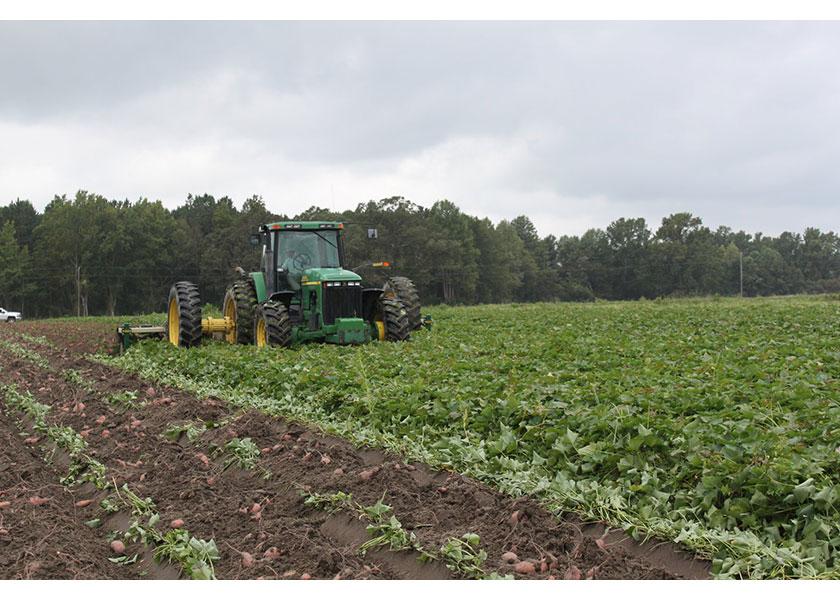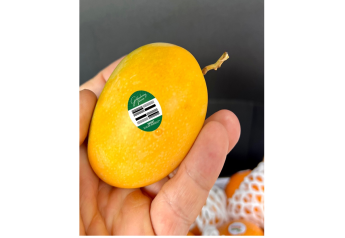North Carolina growers account for almost 70% of U.S. sweet potato crop

North Carolina sweet potato growers account for almost 70% of the U.S. sweet potato crop, said Heather Barnes, marketing representative for the North Carolina Department of Agriculture.
Part of that hard-won dominance, she said, is the fact that North Carolina has the perfect combination of soils and temperatures that sweet potatoes need. “(Sweet potatoes) are a great fit for eastern North Carolina,” she said.
The Interstate 95 corridor, around Wilson, Nash, Johnston and Sampson counties, is the heart of sweet potato country.
The growing region includes part of the Piedmont region and a little bit of the eastern part of the state, but not too far east.
The farther east in the state you go, the soil is blacker and not as well suited for sweet potatoes, Barnes said.
This year in early May, producers were growing the sprouts that will be transplanted into the fields.
Typically, North Carolina growers start harvesting sweet potatoes in August.
Legacy
The North Carolina Sweetpotato Commission recently celebrated its 60th anniversary, and the industry was around well before that.
“We have a long history here of sweet potato farming and are pioneers of developing the industry, from harvesting to packing to storing,” Barnes said.
In the last 10 to 15 years, she said, growers have become more sophisticated in food safety measures, have installed new packing lines and built new storage facilities to help market greater volume and acreage in the state.
2021 harvested area for fresh and processing sweet potatoes combined was nearly 105,000 acres, up from 92,000 acres in 2017 and more than double the acreage of about 40,000 in 2007, according to USDA statistics.
In 2021, about 88% of the entire North Carolina sweet potato crop value was derived from the fresh market, according to the USDA.
All of the research and infrastructure investments in North Carolina sweet potatoes have allowed North Carolina sweet potatoes to be available all year long, she said, both for domestic and export customers.
Value-added
An ongoing trend has been the rise of value-added products that include sweet potatoes, Barnes said. That greater utilization has helped cut down food waste, she said.
“It allows us to use every potato that comes out of the field,” she said.
Besides fresh market sales, sweet potatoes are processed into French fries, canned, made into flour, pureed, dehydrated for ingredients in dog food and used as a supplemental feed for cattle and pigs.
Always promoting
Barnes said the North Carolina Department of Agriculture works with the North Carolina Sweetpotato Commission to build fresh sweet potato demand.
In particular, Barnes said she has been engaged in work with registered dietitians and nutritionists across the country.
“We've been working to develop programs with runners and are now looking to expand that into other athletic fields,” she said.
Barnes also worked with North Carolina restaurants for a weeklong promotion last fall.
“We're looking at doing that again and making that a yearly event,” she said.
Taken together, Barnes said promotions from the commission and the state are directed at consumers, retailers, foodservice operators, dietitians and other influencers.
Packaging
One of the industry changes over the past 15 years has been the increased use of packaging at retail.
Twenty years ago, sweet potatoes were almost exclusively sold in 40-pound cartons and typically put out on retail displays in bulk form.
“Through the years that I've been working with sweet potatoes, I'm now seeing (more of) them into 3-pound bags,” he said. In addition, smaller sweet potatoes are offered in convenience trays and wrapped individually for microwave cooking.
“In the fresh market section over the past 12 years, I've seen a lot of changes in what consumers are asking for,” she said. “Our farmers and shippers are able to innovate and meet those demands for different packaging and even different-sized products.”







